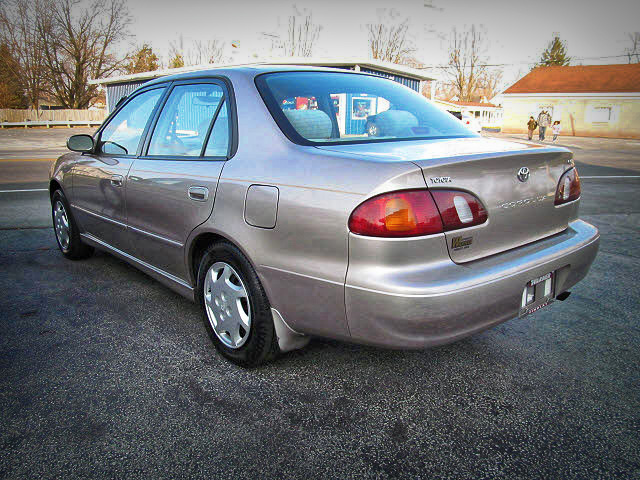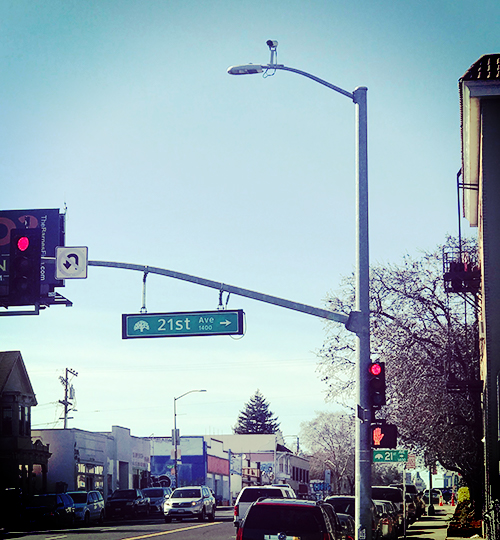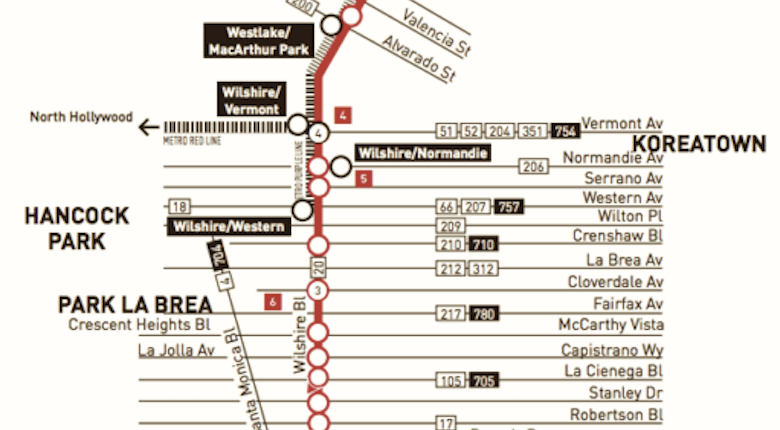By DeMara Palmer
Published on January 10, 2017
A large part of my daily life has been dedicated to singing like I’m the next Beyoncé, having full-blown conversations with myself, and immersing myself in deep thoughts. Since social norms discourage me from doing these things in public, it was important to have a designated space of my own. I luckily found the perfect location, a place that has become a second home to me, a place where relationships can blossom and gatherings held. I can completely let go and be myself in this space, and although I value my alone time here, I also invite others to join me in dancing, talking, or reflecting with me. I have had many adventures in and through this space, and given many pep talks to myself.
I present to you, my all-gold, muffler-roaring, bass-pumping baby. My 1998 Toyota Corolla.

When I enter my car, the sweet scent of vanilla greets me with an aura of comfort. It’s like a voice says to me, “Honey! Welcome home!” Ever since the car was given to me, I have experienced the responsibilities of vehicle ownership and have learned to become more independent. Unlike my room at home, where there is no way to maneuver around my mother’s “my roof, my rules” policy, where she and the rest of my family could enter at any given time, I can count on privacy and security in my car.
“Reverse to the left to get traction!”
An unfamiliar voice called out to me. Here I was, caught in my very first ice storm, stuck on a hill only 800 meters from my house. I floored the gas pedal and saw the speedometer jumped from 0 km to 80 km, but the car did not move an inch.
“Keep reversing, you’re almost there!” The stranger encouraged me.
“There you go, there you go!” He said as I regained control of my car and began to drive down the hill.
“Thank you so much!” I called out to the man, grateful for his help.
But as I tried to slow down while approaching the left turn lane, I realized that my brakes were not doing their job. With a heavier foot, I slammed down on the brakes, attempting to bring the vehicle to a complete stop, but my car instead did a 360 and planted itself into the curb. At that point, I had squeezed my eyes shut and tried to ignore my heart beating out of my chest.
“Don’t you know what to do when your car skids?”
“You have to be careful when you’re driving on ice!”
“Why weren’t you more careful? You know you can’t stomp on your brakes when the roads are slippery!”
I did not know how to control my car in icy road conditions. Prior to the accident, I could count on feeling responsible and independent whenever I entered my car, and liberated and free each time I went for a spin. But those short few minutes of skidding on ice, the space I called my second home became full of tension and discomfort, even terror. I was afraid to enter my car for many days afterwards.
Some might believe that the unrestricted motion of individuals is an absolute right, and that includes exercising mobility through modes of transportation like the automobile. My car did initially provide me with a sense of security, safety, success, and freedom, but if I learned anything from the accident, it would be that these characteristics along with my automobility could vanish in a quick moment.
My car is not a person or a confidant, but it is more than just an object. It is a place. It is a meaningful segment of geographical space, which can transform to fit the need of those that use it. While it is argued that spaces can be exploited, on a more positive spectrum, places are said to be homes for humanity. Each given interaction in my car is different depending on the day. My Corolla is a place with meanings and purposes that change from time to time, location to location. My relationship to this place is contingent on many factors, including icy road conditions.
Works Cited
- Cresswell, Tim. 2008. “Place: Encountering Geography as Philosophy.” Geography 93 (3): 132-139.
- Jonas, Andrew, Eugene McCann, and Mary Thomas. 2014. Urban Geography: A Critical Introduction. Chichester, West Sussex ; Malden, MA : Wiley Blackwell.
- Urry, John. 2004. “The ‘System’ of Automobility.” Theory, Culture & Society 21 (5): 25-39.
 DeMara Palmer has completed a double major in Psychology and Women’s Studies at the University of Toronto Scarborough. Upon graduating, she is deciding to take a year off before applying to her Master’s. DeMara lives by the motto “Spontaneity is Key,” as she would be more likely to go with the flow than to follow a set agenda, allowing her to relax, travel and enjoy life with minimal “big girl” responsibilities. One of her favourite relaxation methods is spending countless hours on YouTube, and discovering new music.
DeMara Palmer has completed a double major in Psychology and Women’s Studies at the University of Toronto Scarborough. Upon graduating, she is deciding to take a year off before applying to her Master’s. DeMara lives by the motto “Spontaneity is Key,” as she would be more likely to go with the flow than to follow a set agenda, allowing her to relax, travel and enjoy life with minimal “big girl” responsibilities. One of her favourite relaxation methods is spending countless hours on YouTube, and discovering new music.


